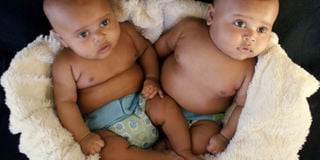What food must I eat to have twins?

What you need to know:
There are claims that a diet containing a certain type of yam-like tuber is responsible for the high number of twin births among certain people of Nigeria. However, it is no guarantee that eating the same will give you twins.
Dear Doctor: I want twins, which food can I eat? I have heard that you can get twins by eating fish gills and sweet potatoes which are yellow on the inside.
Stella
Dear Stella: There are two types of twins. Identical twins result from a single fertilised egg that completely breaks up into two, a few days after fertilisation. These therefore occur by accident or chance.
Fraternal twins are those that do not resemble and result from a woman shedding two eggs which are then fertilised. Both hereditary and environmental factors (both nature and nurture) may be determinant in a mother giving birth to twins.
Twins are more common in older mothers (30-40 years), who are above average height and weight or have had several previous pregnancies.
Women who become pregnant while breastfeeding are also more likely to get twins than women who get pregnant while not breastfeeding.
The Yoruba of Nigeria are said to have the highest number of natural twins in the world (94-105 twins per 1,000 live births) possibly because of high consumption of a certain yam that has substances that have been said to stimulate the ovaries to release more than one egg. However, even if you ate this yam, it is not foolproof that you will then get twins.
Twins have also increased in the Western world due to fertility drugs and test tube babies as well as the use of growth hormones in cattle to enhance milk and beef production.
The hormones find their way into animal milk, increasing sensitivity of the ovaries to increase ovulation and twins. Yellow sweet potatoes contain Vitamin A, which is good for the skin and eyesight but are unlikely to give you twins.
Dear Doctor: I am due to start family planning but many people have discouraged me from using the coil (intra uterine device). I want this because I am overweight and my husband has lost interest in me.
Fattie Nabbosa
Dear Nabbosa: The intra uterine contraceptive devices (tagged coils from the olden devices made in form of coils) used in Uganda are not darted with hormones and thus will not cause side effects such as weight gain and loss of sexual desire, which are related to hormones.
The intra uterine device (IUD) has very many advantages compared to disadvantages, and after proper counselling about it, please go ahead and use it.
Apart from being very effective in preventing pregnancy for between five to 12 years or until it is removed, it starts working straight away, is inexpensive, and convenient.
The IUD can also be removed by the doctor at any time, and a woman will be able to get pregnant immediately.
Many people claim the “coil” can be felt by a sexual partner but even then, the strings can be cut shorter.
Among the problems associated with use of an intra uterine device include cramps and backache within the first few hours after insertion, bleeding and pain for a few weeks after insertion as well as heavier periods especially if the device is of the copper T type.
Much as the newer “coils” have nylon instead of braided strings to prevent infection, they do not protect one from sexually transmitted infections (STIs), requiring that the one avoids having multiple sexual partners.
Dear Doctor: It is three years since I got married but I have no child. I have been tested and told that my (fallopian) tubes were blocked. Is there a way they can be unblocked so that I get a baby?
Stella, Kasese
Dear Stella: One of the most common causes of infertility in Ugandan women is blocked fallopian tubes which may be due to adhesions outside the tubes (like after appendicitis) or scars inside the tubes resulting from untreated sexually transmitted infections.
Salpingolysis is the surgery done to release the tubes from such adhesions while salpingostomy is the surgery done to repair the scars and make tubes clear to allow pregnancy to take place.
The success of the operations depends on many factors including; the extent of scarring and age of the woman.
Sometimes, a woman may fail to conceive after the tubes have been unblocked because of other factors such as age and fibroids.
Therefore, a woman with blocked tubes has to be tested for presence of other problems before the surgery. The inner hairs in the patent tubes, which propel the fertilised eggs to the womb, may have been damaged leading either to an ectopic pregnancy (pregnancy inside the fallopian tubes) or no pregnancy at all.
However, this should not cause you to despair and deter you from seeking the operation because in your case, it may be successful.




